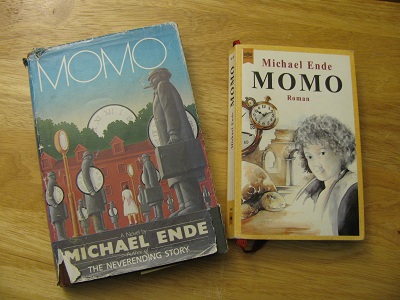 It’s time for Sonderling Sunday! That time of the week when I play with language by looking at phrases in children’s books and how they’re translated into German.
It’s time for Sonderling Sunday! That time of the week when I play with language by looking at phrases in children’s books and how they’re translated into German.
But today we’ll go the other way! Today I’m looking at one of my favorite children’s books ever, Momo, by Michael Ende, which was originally written in German. So we’ll look at how it was translated into English.
When my family first moved to Germany in 1996, I think it was our second night there when we found a bookstore. I had no idea what to buy — and then I saw a copy of Momo! And realized it was originally written in German and got very excited and purchased it. I also bought a detailed road-and-hiking map of our region that I used over and over and over again, so that was a productive and memorable bookstore visit.
Last time I covered Momo was 2016. We are in Kapitel 4, which in English is just called “Two Special Friends,” but in German is called Ein schweigsamer Alter und ein zungenfertiger Junger (“A silent old man and a tongue-ready young man.”) Now we’re ready to meet Guido, the “tongue-ready” young man. We’re on page 30 in my English edition, Seite 45 in German.
Here’s the first sentence of the next section:
Der andere beste Freund, den Momo hatte, war jung und in jeder Hinsicht das genaue Gegenteil von Beppo Straßenkehrer.
= “Momo’s other special friend was not only young but the exact opposite of Beppo in every respect.”
hübscher Bursche = “handsome fellow”
verträumten Augen = “dreamy eyes”
einen schier unglaublichen Mundwerk
= “an incredible gift of the gab”
(“a sheer unbelievable Mouth-factory”)
Er steckte immer voller Späße und Flausen
= “he was always playing practical jokes”
(“He was always full of jokes and nonsense”)
Interesting. In English his nickname is Guido, but in German it’s Gigi. Probably too feminine-sounding in English.
Fremdenführer = “Guide” (“Stranger-leader”)
Schirmmütze = “peaked cap”
Dichter = “poets”
Reisende = “tourists”
This is fun. There’s a list of Guido’s odd jobs, and some nice long German words are included.
Trauzeuge = “witness at weddings” (Google says “best man”)
Hundespazierenführer = “dog walker”
Liebesbriefträger = “deliverer of love letters”
Beerdigungsteilnehmer = “mourner at funerals”
Andenkenhändler = “souvenir seller”
Katzenfutterverkäufer = “cat’s meat man” (“cat’s-feed-seller”)
Armseligkeit = “poverty”
unermüdlichem Fleiß = “perseverance” (“tireless diligence”)
tadelte = “chided”
Leichtfertigkeit = “irresponsibility”
Gegend = “neighborhood”
tagtäglich = “day by day”
Eroberer = “invaders”
immer zahlreicher = “ever-increasing numbers” (“always number-richer”)
unheimliche Weise = “uncanny knack”
auffielen = “noticed”
die grauen Herren = “the men in gray”
spinnwebfarbenes = “the color of a spider’s web”
auf dem obersten Rand der Ruine aufgetaucht waren
= “peering over the edge of the ruined building”
keine gewöhnliche Kälte = “no ordinary chill”
leise und doch gewaltige Musik = “soft but majestic music”
And the last sentences of the chapter:
Momo machte sich keine Gedanken mehr über die seltsamen Besucher. Auch sie hatte sie vergessen.
= “She thought no more about her weird visitors, and it wasn’t long before she, too, forgot them.”
That finishes out Chapter Four. Lots of phrases here that might be useful on my trip to Germany. I hope I’ll find an Andenkenhändler and get a chance to be auf dem obersten Rand der Ruine aufgetaucht waren.
Until next time! Bis nächste Zeit!